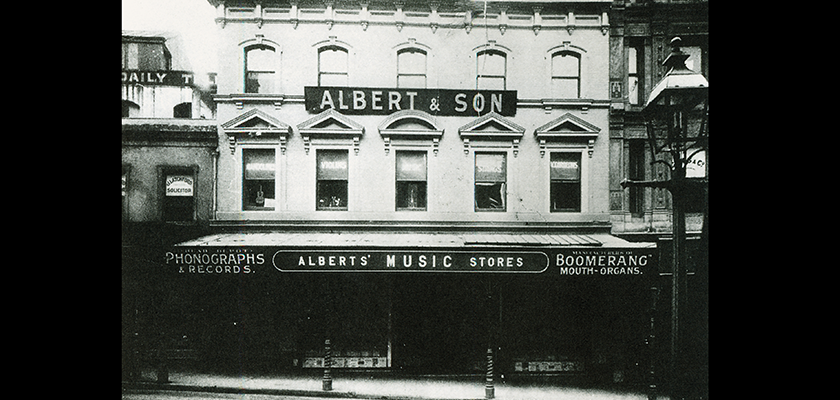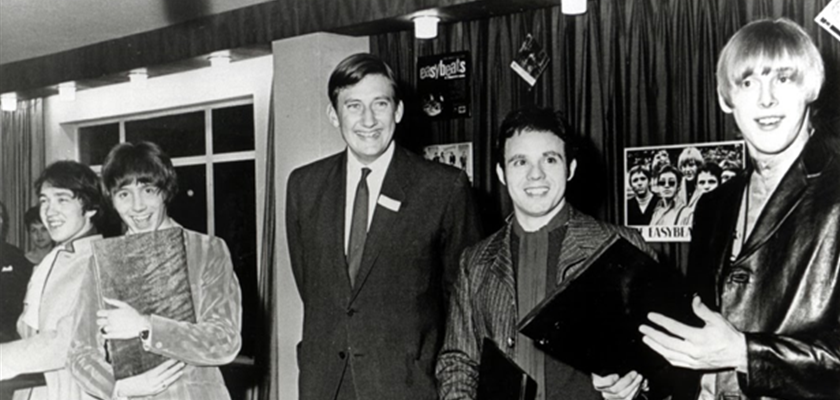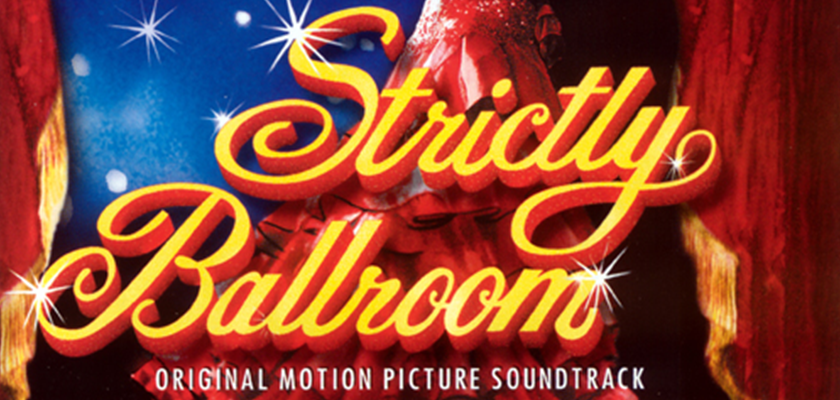OUR HISTORY
Albert family and positive impact
Since 1885 Alberts has played a vital role in the evolution of Australia’s media and popular culture, from the early days of music publishing through to the birth of commercial radio and television and the Australian pop and rock music industry. Driven by an entrepreneurial spirit Alberts has supported artists from AC/DC to the Easybeats and Baz Luhrmann and has never been afraid to back technological and social change.
Led by the fifth generation, the family company is now focussed on impact investing, backing pioneering founders who share our vision for a better tomorrow.

Making Moves
Our history of pioneering
-
1885
Newly-arrived Swiss immigrant watchmaker Jacques Albert establishes a watch and clock repair shop in Sydney’s Newtown
-
1894
Recognising the demand for music for entertainment Jacques launches Alberts’ Music Stores in the Sydney CBD, selling instruments and sheet music
-
1894
Jacques’s son Frank Albert joins the business, which is registered as J Albert & Son. Frank begins to secure the international trademark for the word and symbol of the boomerang
-
1896
Alberts begins importing and selling Boomerang mouth organs: cheap, portable and simple to play, they are an instant success.
-
Late 1890s
Alberts begins selling Boomerang Songsters, pocket-sized books of music and lyrics to the popular songs of the day
-
1901
Capitalising on the immediate return from the Boomerang Songsters and mouth organs Jacques Albert sails for New York and starts to partner with the publishers of the hit ‘Tin Pan Alley’ songwriters such as Irving Berlin to represent their music in Australia and New Zealand.
L to R: Irving Berlin, Jerome Kern, Victor Herbert, Jene Buck, John Philip Sousa, Harry Von Tilzer, Chaz K Harris.
-
1926
Frank Albert co-founds the Australasian Performing Right Association (APRA) to protect the rights of songwriters, music publishers and composers.
-
1929
As radio becomes more popular as home entertainment, Frank Albert and partners win the Australian government tender to establish a national network of radio stations. They call it the Australian Broadcasting Company (ABC) and run it successfully for three years until the government resumes control in 1932
L to R: Sir Harry Percival Brown, Stuart Doyle, Frank Albert and Ben Fuller.
-
1933
Frank Albert takes over radio station 2UW, the first of what will become a successful stable of seven radio stations nationally that Alberts runs until 1995, ultimately overseen by Frank’s grandson Tony Albert.
-
1954
The introduction of television provides another outlet for broadcasting and promoting music. In 1954 Frank Albert’s son Alexis Albert became a founding director, and Alberts a shareholder, of Sydney television station ATN-7.
-
1964
With the arrival of Beatlemania in Australia Alexis Albert’s son Ted Albert founds Albert Productions, an independent music production company, to identify and secure an Australian pop and rock sound. The first band signed is Billy Thorpe & the Aztecs closely followed by The Easybeats and later Ted Mulry Gang and John Paul Young.
L to R: The Easybeats: George Young, Stevie Wright, Gordon “Snowy” Fleet, Harry Vanda; Ted Albert in the middle
-
1968
Fifa Riccobono joins Alberts in a secretarial position and is ultimately appointed Alberts CEO, the first woman to hold such a position in the Australian music industry.
L to R: Fifa Riccobono and Angry Anderson
-
1970
Albert Productions record label is launched.
-
1974
Ted Albert brings recording in-house to the Albert Studios in King Street. The studios are also hired by non-Alberts bands including Midnight Oil, Cold Chisel, Hoodoo Gurus and Mental as Anything.
-
1974
Alberts signs newly formed rock band AC/DC, later signing The Angels, Rose Tattoo and Stevie Wright. By 1976 AC/DC would sign a worldwide deal with Atlantic Records; and in 1980 Back in Black is released, going on to become one of the highest selling albums of all time.
Credit: Photography by Philip Morris. L to R: Phil Rudd, Angus Young, Malcolm Young and Bon Scott
-
1989
Ted Albert moves into film production with the formation of M&A Productions, engaging young director Baz Luhrmann to write a film adaptation of his 1988 stage play Strictly Ballroom for the screen. In 1992 Strictly Ballroom is released accompanied by Alberts first film soundtrack, in collaboration with Baz Luhrmann.
-
1994
Tony Albert flicks the switch from AM to FM and after 69 years 2UW becomes MIX 106.5.
-
1995
Alberts sells its stable of national radio stations to Australian Provincial Newspaper Holdings Ltd, and sets up a diversified investment portfolio run by Tony Albert.
-
2001
Alexis Albert’s son and Alberts chairman Robert Albert oversees a joint venture with Wayne Stuart, Piano Australia, to manufacture the unique Australian-designed and locally made high quality, handcrafted piano, the Stuart & Sons piano.
L to R: Robert Albert and Wayne Stuart
-
2004
Robert Albert’s son David Albert joins Alberts and builds the music roster to include hit local songwriters including Wally DeBacker (Gotye), Josh Pyke, San Cisco, Megan Washington, Tim Levinson (Urthboy) and Jess Cerro (Montaigne).
Credit: Photography by McLean Stephenson. Music artist featured is Megan Washington
-
2009
Alberts in conjunction with APRA AMCOS launch the Vanda & Young Global Songwriting Competition. Recent winners include Amy Shark, Matt Corby and the Preatures.
Credit : logo artwork created by Reg Mombasa
-
2012
The fifth generation of the family launches The Tony Foundation, Alberts philanthropic arm. Named after Tony Albert it strives to enable positive social outcomes through the power of music.
-
Present
Now in its fifth generation of family ownership, Alberts is focused on backing the next generation of pioneers out to create a better tomorrow.























